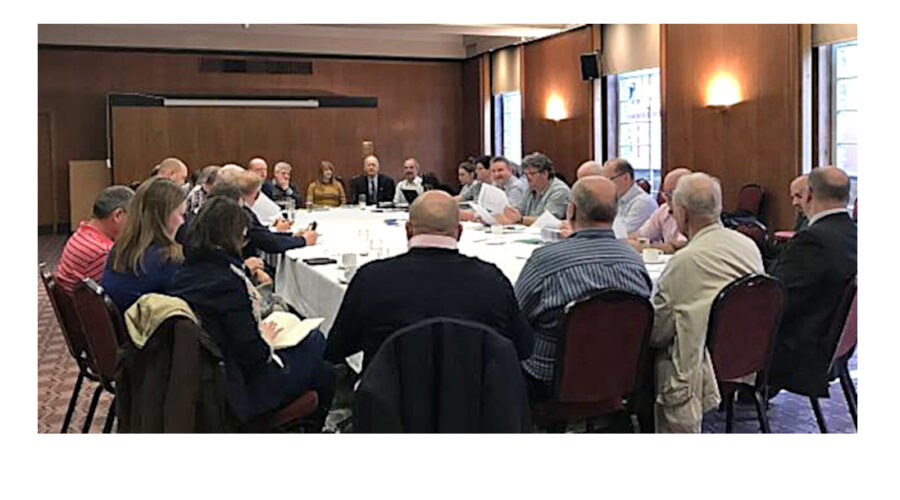Industry move to highlight shellfish management – Cross-industry group set up south of the border
A groundbreaking initiative has been launched to raise the profile of the shellfish sector south of the border, and develop a management strategy for the sector, reports Tim Oliver
Shellfish interests from across England, Wales, Northern Ireland and the Channel Islands met in London to form a cross-industry working group.
The aim is for the group to work with fisheries scientists and government to define a strategy to deliver sustainable and profitable shellfisheries for the future. The group is focused on the pot fisheries for crab, lobster and whelk, but without losing sight of the wider fisheries management context.
Main image: Delegates at the groundbreaking meeting to form a cross-industry shellfish working group.
The NFFO’s shellfish committee played a major role in organising the meeting, and the federation’s chief executive Barrie Deas said: “The background to the new group is a widespread feeling that shellfish, despite its economic and social importance, hasn’t achieved the political and management priority which it deserves.”
He added that the inspiration for the initiative had come from the Scallop Industry Consultation Group, which plays a parallel role for the scallop sector (Fishing News, 11 April, ‘Scallop conference shows way ahead for scallop sector’).
“The government’s current commitment to the development of different forms of co-management across the fishing sector provides an opportunity for the industry to shape policy, science, and the management regime – if it can speak with a clear and coherent voice.
“There is a recognition that the shellfish sector is extremely diverse in terms of vessel size and operations, and all voices in the industry must be heard. Membership will be open to all industry groups willing to commit to working collaboratively on an evidence-based approach to managing the shellfisheries.”
DEFRA and Northern Ireland fisheries department officials attended the inaugural meeting, demonstrating a commitment to working jointly with the shellfish sector on solutions to the challenges it faces.
“There is a broad recognition across government that in fisheries, delivering effective management requires a close working relationship, if ineffectual policies and unintended consequences in this complex area are to be avoided,” said Barrie Deas.
He said that the composition of the group and definitive terms of reference had been deliberately kept open, to encourage involvement and to ensure that the new group is ‘responsive and relevant’.
“It was encouraging that the big industry players were all present, and the NFFO and Shellfish Association of Great Britain (SAGB) membership provided the backbone of the support.”
The meeting agreed that the small-scale sector of the shellfish fleet sometimes finds it difficult to make its voice heard, and that this must be addressed.
“The central part of the meeting was occupied by an animated discussion of the issues facing the industry, and possible solutions,” said Barrie Deas.
“Although there was no consensus on the route forward, there was unanimity that we should examine all the options dispassionately, and with all the relevant evidence that can be marshalled to hand.
“There was also solid agreement that the work of the group must have momentum, and that whatever obstacles are encountered – and there are bound to be many – the initiative would keep going to produce real results. I think the group has the potential to be a really significant development.”
He said that effort displacement was a big factor in many of the fisheries management challenges facing the industry, including the small-scale and shellfish sector.
“There’s a whole complex of issues, and the thing about the shellfish and the small-scale sector is to try to put things on a factual footing, instead of relying on hearsay. That’s what the shellfish and scallop groups and the inshore sector have in common – the need to have a good, factual basis on the situation from where we can start to talk about future options.”
The group agreed that its first step should be to conduct an overview, with the pros and cons of each management option spelt out. A meeting in February will take the project forward.
While the NFFO, and in particular its shellfish committee, have played a central role in launching the initiative, ‘the group will steer its own course forward’, said Barrie Deas.
Seafish, which organised the recent successful inshore fisheries management conference, will provide a secretariat for the new group.
Challenges facing the shellfish sector
- Displacement of fishing effort from other sectors into the shellfish sector
- Rapidly growing fishing effort in the shellfisheries. There is a feeling that additional fishing effort will push many shellfisheries into the downward slope of the effort/yield curve
- A dynamic but volatile market is driving major change within the industry, not least in the 12-15m sector
- Rapid technological development is a major factor
- A need for coherent and evidence-based management
- Brexit may carry market implications, and there are also implications for the future of the Western Waters effort regime, and what may or may not replace it
- The conclusions of the inshore conference in October could be significant for the work of the group. It will be important to have cross-fertilisation, but not duplication








